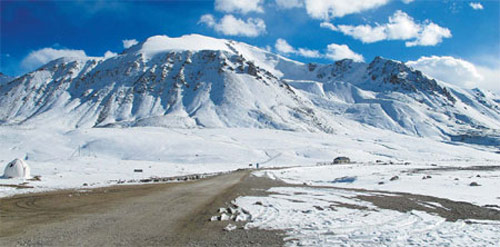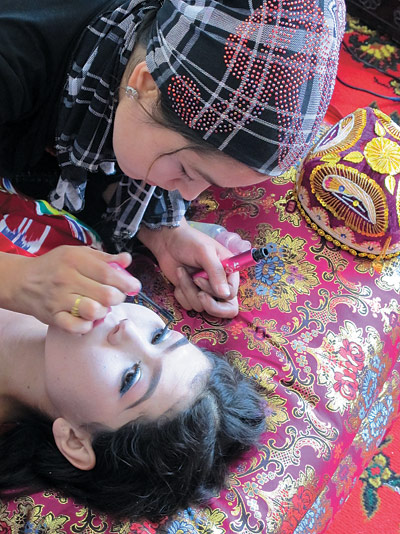
 |
|
Breathtaking scenery at the 5,100-meter-high China-Pakistan border on the Pamir Plateau. Photos by Zhang Zixuan / China Daily |
 |
|
During preparations for a Uygur wedding, the bride lies down on the carpet so that makeup can be applied on her face. |
A landmark for Silk Road merchants and modern filmmakers, this bustling city entrances visitors with glimpses into many cultures. Zhang Zixuan reports from Kashgar, Xinjiang Uygur autonomous region.
In ancient times, Kashgar was a crossroads for traders and a gathering place for tribal peoples across the region. Known by the Chinese as Shule in those days, the modern name for this city of about 350,000 is Kashi.
The 2007 film The Kite Runner was filmed here, and the city today reflects all the cultural flavor of the many ethnic groups who live in Xinjiang Uygur autonomous region. In this relaxed western frontier, no one seems to be in a hurry.
Up on a 40-meter high and 800-meter long cliff at the northeastern end of Kashgar old town, the Tower Houses - randomly shaped Uygur homes that gradually expanded over the years - stand proudly alongside the new city areas.
Along the street, a goat stands up and leans against a tree to reach the leaves. Not far away, vehicles stop to let a flock of sheep pass.
Local residents favor motorcycles to get around. Wives sit cross-legged on the backseat behind their husbands. When tourist buses pass by, the women wave and give a big smile.
At any age, Uygur women care about their appearance. Their turbans are matched beautifully with dresses and shoes. For religious reasons, Uygur women seldom show their legs, but with the help of flesh-colored tights, they can wear a wide array of colorful clothing.
Uygur people are not camera shy, especially the women and children. They change poses when they notice they are the objects of focus. Some of them even ask to examine the pictures to make sure the camera has captured their most attractive moments.